LEAP has changed me for the better, and I hope that it will continue to change me as I reflect on each learning that I got.
Communication is one of the most important leadership skills. It is a skill that...

Lorem ipsum dolor sit amet, consectetur adipiscing elit, sed do eiusmod tempor incididunt ut labore et dolore magna aliqua. Ut enim ad minim veniam, quis nostrud exercitation ullamco laboris nisi ut aliquip ex ea commodo consequat. Duis aute irure dolor in reprehenderit in voluptate velit esse cillum dolore eu fugiat nulla pariatur. Excepteur sint occaecat cupidatat non proident
Leadership purposed for a sustainable world.
‘We cannot solve our problems with the same mindset that created them….You gotta be the change you wish to see in the world!’
Albert Einstein
The question of transitioning to sustainability, creating thriving and flourishing living systems highlights the need for conscious leadership development.
There is a need to address leadership, to educate and prepare students to lead solutions for sustainability and to focus on the role of the inner dimensions (described as people‘s mindsets consisting of values, beliefs, world-views, motivations and associated cognitive, emotional and relational capacities) of human beings and the potential of inner transformation as a powerful leverage point for sustainability.
The LEAP YOUth program uses the Inner Development Goals (IDG)framework as main content. This framework refers to the skills and qualities needed as a leader to successfully work with complex societal issues, in particular those identified in UNs Agenda 2030 and the 17 Sustainable Development Goals.
The framework is divided in 5 main dimensions and 23 skills.
The LEAP YOUth programme runs over 10 months (starting in March and finishing in December) and is held in English with most elements being online. There is an onsite cohort who will have two onsite meetings at the beginning and in the middle of the program.
Additionally, there is also an online cohort, who will continue to have all modules online throughout the duration of the program to take into account different needs of the community. The journey is divided into 2-month long modules, each covering 1 Inner Development Goal. All modules follow the same structure.
LEAP adopts transformative and emancipatory perspectives to education seeking to stimulate self-awareness and critical thinking. For that we use a rich scaffold of theories, concepts, methods, tools and prac-tices to foster conscious leadership in the context of transformation for sustainability. Below are the most important ones guiding us in this process. The elements explained above are based on those theories.
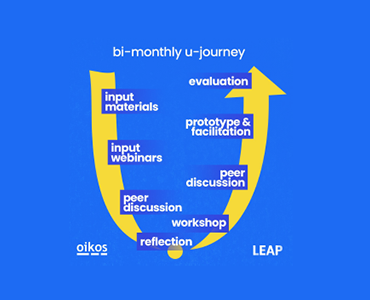
 To support us in this process of working with personal transformation for systemic change in an interconnected way we use Theory U. Theory U is a process created by Otto Schamer that helps us to become aware of the blind spot of leadership: bringing attention both individually and collectively to our inner qualities, to the places where we are operating from: what we pay attention to, and how we pay attention to. By moving through the “U” process we learn to connect to our essential Self, see our own blind spots and pay attention in a way that allows us to experience the opening of our minds, our hearts, and our wills. This holistic opening constitutes a shift in awareness that allows us to learn from the future as it emerges, and to realize that future in the world.
To support us in this process of working with personal transformation for systemic change in an interconnected way we use Theory U. Theory U is a process created by Otto Schamer that helps us to become aware of the blind spot of leadership: bringing attention both individually and collectively to our inner qualities, to the places where we are operating from: what we pay attention to, and how we pay attention to. By moving through the “U” process we learn to connect to our essential Self, see our own blind spots and pay attention in a way that allows us to experience the opening of our minds, our hearts, and our wills. This holistic opening constitutes a shift in awareness that allows us to learn from the future as it emerges, and to realize that future in the world.
As the diagram illustrates, we move down one side of the U (connecting to the world that is outside of us) to the bottom of the U (connecting to the world that emerges from within) and up the other side of the U ( bring-ing forth the profound systemic changes needed in society today.
The 10 month transformational LEAP journey is thought of as a big U journey for the partic-ipants to experience their learning using these leadership capacities
– holding the space
– observing
– sensing
– presencing
– crystalizing
– prototyping
– performing.
Still, for each module of the program (every bi-month) there are smaller U journeys happening.
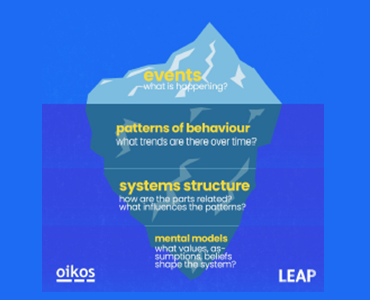
 Our societies’ trajectories remain deeply unsustainable as our dominant technical sustainability approaches have not catalyzed the necessary change. A second aspect of reality has been vastly neglected: individuals and the sphere of human inner dimensions. This means that instead of viewing and framing sustainability chal-lenges as purely technical external problems we should look at them as relationship problems. This broadens the scope and allows us to integrate a deeper analysis in order to find new ways of tapping into our human potential to create effective change towards sustainability. This change refers to the lens through which we see and relate to ourselves and the world around us.
Our societies’ trajectories remain deeply unsustainable as our dominant technical sustainability approaches have not catalyzed the necessary change. A second aspect of reality has been vastly neglected: individuals and the sphere of human inner dimensions. This means that instead of viewing and framing sustainability chal-lenges as purely technical external problems we should look at them as relationship problems. This broadens the scope and allows us to integrate a deeper analysis in order to find new ways of tapping into our human potential to create effective change towards sustainability. This change refers to the lens through which we see and relate to ourselves and the world around us.
There are several theories and frameworks that underlie the understanding and analysis of inner transformation in the context of leadership for sustainability. These theories have in common the understanding that systemic change and personal transformation are deeply interconnected, and that addressing mindsets might hold the most potential for transforming systems for sustainability. Many of these theories and frameworks are based on the Iceberg Model.
The iceberg model explains that what we can see, the 10% part of the iceberg that is visible above the surface of the sea, are the events that define our world today. However, around 90% of the iceberg is invisible to us. And what is hidden beneath the surface, are the underlying patterns, structures and mindsets that are responsible for creating the events that define our world today.
According to this model, the capacity to address and reflect on our own mindsets and potentially adopt new paradigms, is one of the most powerful ways to dramatically influence sustainability outcomes, considered a deep leverage point for change.
The iceberg model also indicates that we can work at different levels towards sustainability: at the level of behavior, at the level of structural change, at the level of cultural change, and at the psychological level. This last is the level of our mindset, or how we make meaning regarding the world around us. Society needs to address all these levels if we aim to create the kind of change we are hoping for. However, today, the goals to meet climate change and other sustainability challenges are generally located mainly at the behavioral and structural level, with technical and political responses, which relates to the systems and structures we create and use to organize society. However, to focus at the same time at the personal sphere, looking at the individuals, our shared beliefs, values and worldviews that influence how we see the system and how we see ourselves in relation to the system, is critical to lead change.
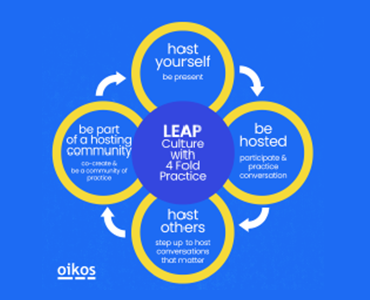
 The 4 Fold practice is a practice introduced from the Art of Hosting organization to guide the different levels of participation. This is the practice that inspires our partici-pants to create a culture of caring and collaboration. This is the way they should navigate all the LEAP process in these 10 months as a participant, but also to get inspired to live and bring it back within their communities.
The 4 Fold practice is a practice introduced from the Art of Hosting organization to guide the different levels of participation. This is the practice that inspires our partici-pants to create a culture of caring and collaboration. This is the way they should navigate all the LEAP process in these 10 months as a participant, but also to get inspired to live and bring it back within their communities.
By promoting a culture of hosting in 4 different levels, they learn how to take personal care and deep care for others, assessing needs and taking leadership for creating healthy communities of learning.
By promoting a culture of hosting in 4 different levels, they learn how to take personal care and deep care for others, assessing needs and taking leadership for creating healthy communities of learning.

 Every active oikee and alumni can apply to become a LEAP participant.
Every active oikee and alumni can apply to become a LEAP participant.
You can apply from January 1st to January 31st.
Find information on the criteria based on which participants are chosen here.
Watch a video of theInfo Call.
You can watch the video of the Strategy Presentation 2023.
Participants are required to commit to attend/deliver at least 70% in each element.
The commitments of the program are:


You would like to get engaged in the LEAP as a volunteer?
We have many opportunties.
Find the detailed commitments for each volunteer role here.
This year two of our volunteer coaches offer a coaches training strongly recommended for all new coaches but open to everyone in LEAP, including LEAP Alumni.
You can find more information here.


The work of oikos International and LEAP is only possible through the support and contribution of individuals and organizations that share our vision of creating a more resilient and sustainable world by empowering students to become change agents and conscious leaders of tomorrow.
If you agree that:
And if you are looking for a meaningful way to support this cause, we invite you to join us as a donor and contributor! Donate today either as a one-time donation or contact us to become a monthly/yearly donor to help us sustain ourselves in the longterm.
You want to partner up with the LEAP team to:
Please reach out via leap@oikos-international.org
Find out more about our partnership opportunities here.
The work of oikos International and LEAP is only possible through the support and contribution of individuals and organizations that share our vision of creating a more resilient and sustainable world by empowering students to become change agents and conscious leaders of tomorrow.
And if you are looking for a meaningful way to support this cause, we invite you to join us as a donor and contributor! Donate today either as a one-time donation or contact us to become a monthly/yearly donor to help us sustain ourselves in the longterm.
If you would like to get in contact with us, leave us a message at leap@oikos-international.org
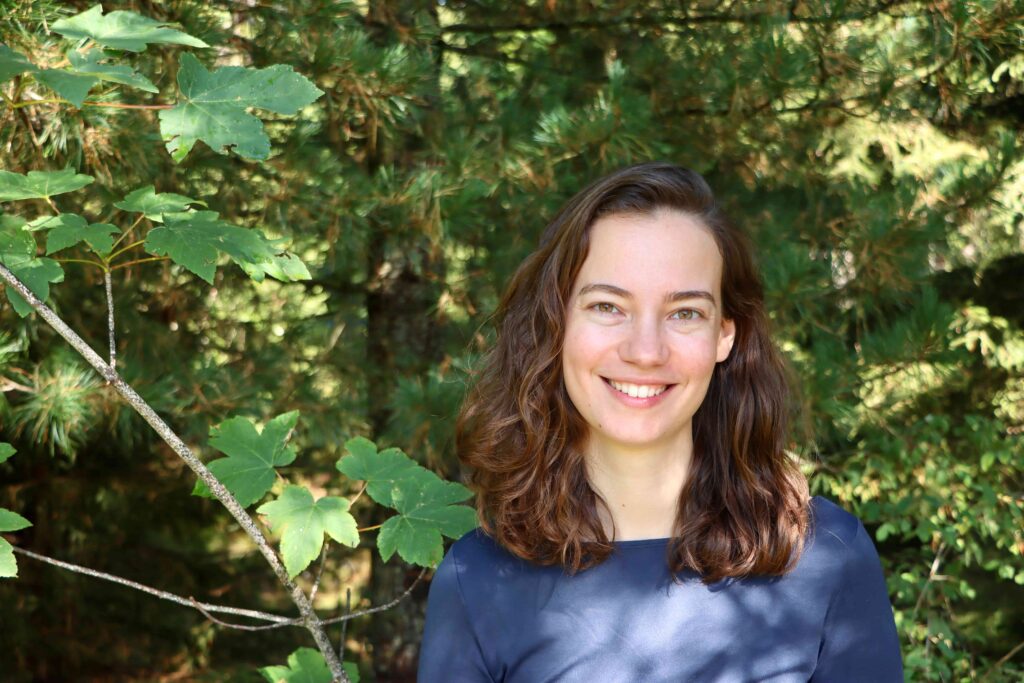
Describe yourself in 3 words:
Empathetic, curious, creative.
Favourite motivation or inspiration quote:
“What we practice, we become. Now is practice.”
Fun fact:
I speak over 6 languages and continue to learn.
Favourite free time activities:
Have deep conversations, explore hidden corners, observe and listen to my surroundings.
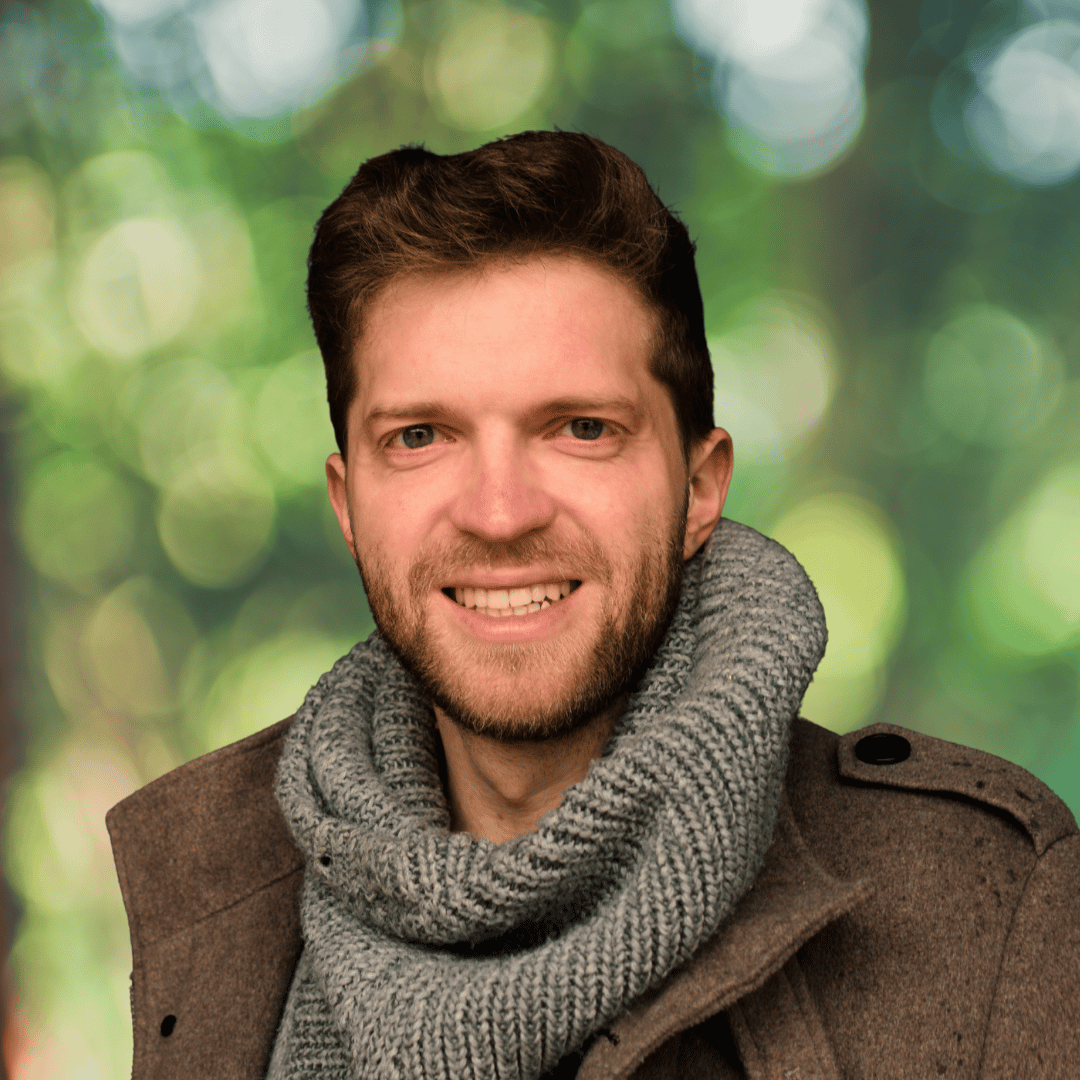
Describe yourself in 3 words:
positive, creative, purpose-oriented
Favourite motivation or inspiration quote:
“Of course I love you. It is my fault that you have not known it all the while.” The Little Prince. Antoine de Saint-Exupéry.
Fun fact:
Most of what I learned about people happened at 3 am working as a bartender.
Favourite free time activities:
Inhaling a forest, watching the sunset and talking to strangers.

LEAP has changed me for the better, and I hope that it will continue to change me as I reflect on each learning that I got.

This self-discovery program was so essential to help us, participants, become responsible leaders.

I feel empowered by all the things I learned, and I am able to make better decisions when it is needed the most.
our programs drive sustainability on campuses worldwide through supporting students’ personal and professional development. by donating you can help keep our work future-proof and accessible to students worldwide.